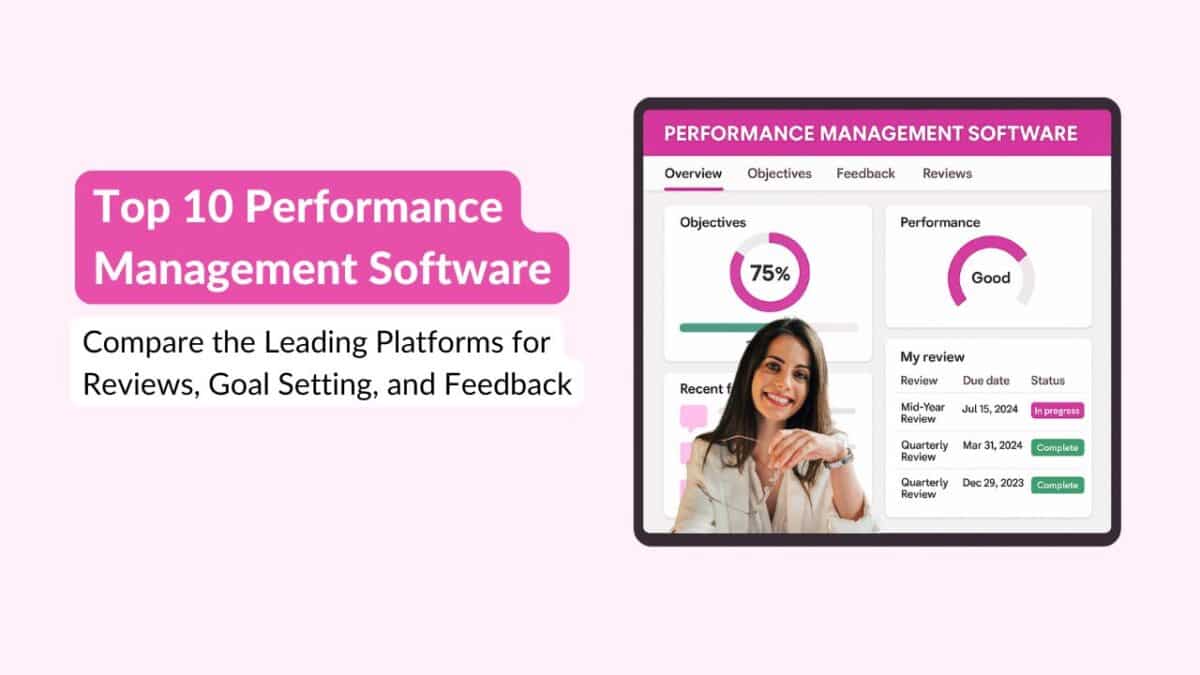Many organizations are now understanding the importance of shifting from traditional performance reviews to more continuous and flexible performance management processes.
While rethinking performance management is at the top of the agendas of many companies, these few organizations have actually managed to redefine their performance management systems.
Companies With Best Performance Management Practices
The following companies are pioneering the way to effective performance management and reaping the benefits of a technically advanced system.
- Accenture
- Juniper Systems
- Kelly Services
- Adobe
- General Electric
- Deloitte
- Microsoft
1. Accenture – Dublin, Ireland
In 2016, Accenture joined the list of organizations that abandoned annual performance reviews. Six percent of Fortune 500 companies have gotten rid of rankings, according to management research firm CEB. Accenture’s new performance management model is designed to represent the ongoing performance discussions between employees and managers in a better way.
Key Innovation: Accenture implemented a “Performance Achievement” system that focuses on forward-looking conversations rather than backward-looking evaluations, aligning with 2025 trends toward predictive performance management.
2. Juniper Systems – Logan, Utah, United States
Beginning in 2009, Juniper started a process of defining, and articulating, its vision, its brand, values, and aspirations to employees. The annual performance review was not viewed particularly well in engendering trust. Employees wanted more regular feedback, no surprises, and the review decoupled from the pay and bonus allocation process.
Juniper Systems eliminated forced rankings and adopted a solution that was more in line with their new performance management perspective.
3. Kelly Services – Troy, Michigan, United States
Kelly Services (an international staffing firm with approximately 650,000 employees worldwide) transitioned away from a culture of annual performance appraisal. Its leaders realized that the performance appraisal process was ineffective and that it wasn’t driving desired results.
They needed a performance management system that would evolve into a means of helping the company find and develop talent as a source of competitive advantage, not just a way to ensure compliance. In 2011, Kelly Services dropped annual performance appraisals. It was the first big professional services firm to drop appraisals, and other major firms followed suit, emphasizing frequent and informal feedback.
Modern Workplace Trend: Kelly Services pioneered the shift toward talent development as competitive advantage, a trend that has become standard practice among performance companies in 2025.
4. Adobe – Mountain View, California, United States
Donna Morris, Adobe’s then Senior Vice President Of People’s Resources, found the annual performance review process complex, bureaucratic, and paper-heavy because it consumed a lot of time.
Adobe abolished stack ranking and annual performance reviews in 2012 and started using a frequent check-in system that system allows managers and employees to discuss their goals and review their performance on a regular basis. Since Adobe has adopted check-in, they have claimed to see better results.
2025 Impact: Adobe’s check-in model has influenced the widespread adoption of continuous feedback platforms across performance companies, with 73% of organizations now implementing similar systems.
5. GE – Boston, Massachusetts, United States
GE is known for its annual performance appraisal process, where an employee’s performance at the end of the year was brought down to a number, based on which they were judged and ranked. The employees who fell in the bottom ten percent lost their jobs.
Today, this form of performance appraisal sounds not only harsh but also reductionist. But you’d be surprised to know that not only did GE promote this form of appraisal aggressively, but other organizations wanted to mimic it. After nearly 30 years, GE did an extremely surprising thing; they discarded their annual performance review process and replaced it with a performance management application that allows frequent feedback
Recent Changes: GE’s transformation represents one of the most dramatic shifts in corporate performance management, influencing how traditional performance companies approach employee evaluation.
6. Deloitte – London, United Kingdom
In a public survey, Deloitte conducted, more than half the executives questioned (58%) believe that their current performance management approach drives neither employee engagement nor high performance.
They needed something quick, accurate, real-time, and more individualized—something that focused on improving future performance.
In 2015, Deloitte made headlines in the April issue of Harvard Business Review, where they said they were redesigning their performance management and listed the changes that their performance management would embrace.
a. no cascading objectives
b. no once-a-year reviews, and
c. no 360-degree-feedback tools
At Deloitte, their new performance management system has three ways of addressing performance:
Recognizing Performance–Recognizing the contributions of individual employees in each team.
Seeing Performance–Getting an accurate picture of performance without any bias
Fueling Performance–Helping employees improve their performance potential
7. Microsoft – Redmond, Washington, United States
For years Microsoft has used a technique, stack ranking, that effectively encourages workers to compete against each other rather than a collaborative Microsoft that CEO Steve Ballmer was trying to push ahead of his retirement. Stack ranking is a process where each business unit’s management team reviews employees’ performance. They rank a certain percentage of them as top performers or as average or poorly performing.
Former Microsoft employees have claimed that it bred competition among colleagues, especially when some employees in a group of individuals need to be given poor reviews to match the method. In 2013, Microsoft revamped its performance management by scrapping stack ranking and replacing it with a process that has more emphasis on team collaboration and employee development.
2025 Workplace Trend: Microsoft’s emphasis on collaboration over competition has become a defining characteristic of successful performance companies in today’s market.
8. Goldman Sachs – New York, United States
In addition to Microsoft, GE, and Adobe (among others), Goldman Sachs has also joined the bandwagon. They have removed the rating aspect of the performance review. In 2016, they finally got rid of the once-a-year aspect of the performance review in favor of something that is more timely and continuous.
The above-discussed companies serve as the best performance management system examples that are leading the change. Performance management is evolving, and to stay ahead of the competition, it is imperative to shift to a system that enhances organizational productivity. Furthermore, it should help create a skilled and dynamic workforce.
Recent Innovation: Goldman Sachs now implements quarterly performance conversations, reflecting the 2025 trend toward more frequent, development-focused discussions among performance companies.
Key Trends Shaping Performance Companies in 2025
1. Continuous Feedback Culture
Performance companies are moving away from annual reviews toward ongoing conversations. This shift enables real-time course correction and improved employee engagement.
2. Technology-Driven Analytics
Advanced performance management platforms now use AI and machine learning to provide predictive insights, helping performance companies identify potential issues before they impact productivity.
3. Employee-Centric Design
Modern workplace trends emphasize employee experience, with performance companies designing systems that serve employee development rather than just organizational compliance.
4. Skills-Based Performance Evaluation
Rather than focusing solely on results, performance companies are evaluating employees based on skill development and future potential, aligning with the dynamic nature of modern work.
Lessons for Modern Performance Companies
The above-discussed companies serve as the best performance management system examples that are leading the change. Performance management is evolving, and to stay ahead of the competition, it is imperative for performance companies to shift to a system that enhances organizational productivity. Furthermore, it should help create a skilled and dynamic workforce.
Best Practices Emerging in 2025:
- Regular Check-ins: Replace annual reviews with monthly or quarterly conversations
- Development Focus: Emphasize growth and learning over punishment
- Collaborative Approach: Encourage team-based performance rather than individual competition
- Real-time Feedback: Implement systems that allow immediate performance discussions
- Data-Driven Insights: Use analytics to inform performance decisions
Conclusion:
As we progress through 2025, performance companies that embrace continuous, employee-centric performance management will continue to outperform their traditional counterparts. The case studies presented here demonstrate that successful transformation requires commitment from leadership, investment in technology, and a genuine focus on employee development.
The modern workplace demands agility, and performance companies must adapt their management systems accordingly. By learning from these pioneering organizations, companies can build performance management systems that drive engagement, productivity, and long-term success.
Ready to transform your performance management system? Learn how leading performance companies are achieving better results with modern approaches.
Want to know how a performance management system can enhance productivity and engagement? Request for a live demo!
Want to know how a performance management system can enhance productivity and engagement? Request for a live demo!
Request A Demo
Author
Srikant Chellappa
CEO & Co-Founder of Engagedly
Srikant Chellappa is the Co-Founder and CEO at Engagedly and is a passionate entrepreneur and people leader. He is an author, producer/director of 6 feature films, a music album with his band Manchester Underground, and is the host of The People Strategy Leaders Podcast.






